Unnecessary Fuss is a american film of genre Documentary
Unnecessary Fuss (1984)

If you like this film, let us know!
- Infos
- Casting
- Technical infos
- Photos
- Videos
- Film quotes
- Characters
- Music
- Awards
Length 26minutes
OriginUSA
Genres Documentary
Themes Films about animals, Environmental films, Documentary films about animal rights, Documentary films about law, Documentary films about politics, Political films, Documentary films about nature
Rating69%










Unnecessary Fuss is a film produced by Ingrid Newkirk and Alex Pacheco of People for the Ethical Treatment of Animals (PETA), showing footage shot inside the University of Pennsylvania's Head Injury Clinic in Philadelphia.
The footage was shot in 1983–1984 by the researchers themselves as they inflicted brain damage on baboons with a hydraulic device. The experiments were conducted as part of a research project into head injuries caused by vehicle and sports accidents. The footage shows the researchers laughing at the baboons as the brain damage is inflicted.
Sixty hours of audio- and videotape were removed from the laboratory during a raid in May 1984 by the Animal Liberation Front, who handed it over to PETA. It was subsequently edited down to 26 minutes with a voice-over commentary by Newkirk, before being distributed to the media and Congress. Charles McCarthy, director of the Office for Protection from Research Risks (OPRR) wrote that the film had overstated the deficiencies in the clinic, but that the OPRR had found serious violations of the Guide for Care and Use of Laboratory Animals. As a result of the publicity, the lab was closed, the chief veterinarian fired, and the university placed on probation.
The title of the film comes from a statement made to The Globe and Mail by the head of the clinic, neurosurgeon Thomas Gennarelli before the raid. He declined to describe his research to the newspaper because, he said, it had "the potential to stir up all sorts of unnecessary fuss ..."
Comments
Leave comment :
Suggestions of similar film to Unnecessary Fuss
There are 8975 with the same cinematographic genres, 12015 films with the same themes (including 3 films with the same 7 themes than Unnecessary Fuss), to have finally 70 suggestions of similar films.If you liked Unnecessary Fuss, you will probably like those similar films :

A Cow at My Table (1998)
, 1h30Directed by Jennifer Abbott
Origin Canada
Genres Documentary
Themes Films about animals, Environmental films, Documentary films about business, Documentary films about animal rights, Documentary films about law, Documentary films about environmental issues, Documentary films about politics, Films about cows, Political films, Documentary films about nature
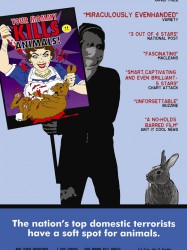
Your Mommy Kills Animals (2007)
, 1h45Origin USA
Genres Documentary
Themes Films about animals, Environmental films, Politique, Films about terrorism, Documentary films about animal rights, Documentaire animalier, Documentary films about law, Documentary films about environmental issues, Documentary films about war, Documentary films about historical events, Documentary films about politics, Documentary films about terrorism, Political films, Documentary films about nature
Rating65%





The film reports on controversies concerning and within the animal rights movement. These include external conflicts between animal rights advocates and medical researchers and restaurant operators, and internal disagreements within the animal rights movement between the animal shelter operators and the confrontationalists who demonstrate outside homes of corporate opponents. The film also discusses the comparison between animal liberation activists and political terrorists, including the FBI's ranking of animal-rights activists as the nation's No. 1 domestic terrorism threat.
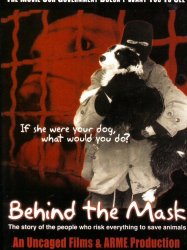
Behind the Mask (2006)
, 1h12Genres Documentary
Themes Films about animals, Environmental films, Films about terrorism, Documentary films about animal rights, Documentary films about law, Documentary films about war, Documentary films about historical events, Documentary films about politics, Documentary films about terrorism, Political films, Documentary films about nature
Actors Chris DeRose, John Feldmann, Kevin Jonas
Rating74%





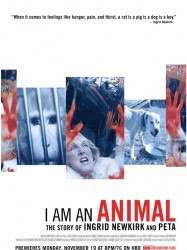
Origin USA
Genres Documentary
Themes Films about animals, Environmental films, Documentary films about animal rights, Documentary films about law, Political films, Documentary films about nature
Actors Pamela Anderson, Bill Maher, Pink
Rating72%





Un regard candide et introspectif sur les croyances et les motivations d'Ingrid Newkirk, la cofondatrice d'origine britannique et force motrice de People for the Ethical Treatment of Animals (PETA), la plus grande organisation de défense des droits des animaux au monde.

At the Edge of the World (2008)
, 1h30Origin USA
Genres Documentary
Themes Films about animals, Environmental films, Seafaring films, Transport films, Documentary films about animal rights, Documentary films about law, Political films, Documentary films about nature
Rating72%





The documentary follows the events that took place during Operation Leviathan in early 2007. The RV Farley Mowat, captained by Paul Watson and the newly acquired MY Robert Hunter, captained by Alex Cornelissen meet in the Southern Ocean. As they are docked side to side, material is transferred from the Farley Mowat to the Robert Hunter to build a new helicopter deck. After some time the Robert Hunter is able to find the Nisshin Maru and engages it. In the course, one of the Sea Shepherd's small boats with two men on board gets lost. Both Sea Shepherd vessels must abandon the Nisshin Maru, which later takes part in the search for them. Finally after 9 hours, they are able to locate them and they are saved. Having lost the Nisshin Maru, the Robert Hunter later finds the Kaiko Maru, a spotter vessel for the Japanese whaling fleet. They engage the ship and during maneuvering through an ice field collide with each other, damaging both ships. As the Farley Mowat approaches, the Japanese vessel calls out a Mayday, stopping the Sea Shepherds from further engagement. As the film ends, we find out that there was a fire on the Nisshin Maru, killing one worker and ending the whaling season early due to damage to the ship.
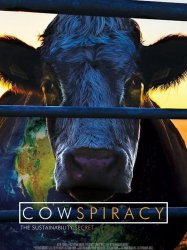 , 1h31
, 1h31Origin USA
Genres Documentary
Themes Films about animals, Environmental films, Politique, Films about the labor movement, Documentary films about business, Documentary films about animal rights, Documentaire animalier, Documentary films about law, Documentary films about environmental issues, Documentaire sur le monde du travail, Political films, Documentary films about nature
Rating80%





Cowspiracy est un documentaire d'importance majeure. Controversé, il se penche sur l'impact de l'élevage sur l'environnement. Kip Andersen, producteur et directeur du film, révèle des informations exclusives portant sur les politiques de groupes environnementaux comme Greenpeace, Sierra Club, Surfrider Foundation, and Rainforest Action Network en plus de statistiques alarmantes sur les impacts que génèrent la consommation de viande.

Sharkwater (2006)
, 1h29Directed by Rob Stewart
Origin Canada
Genres Documentary
Themes Films about animals, Environmental films, Seafaring films, Politique, Transport films, Films about sharks, Documentary films about animal rights, Documentaire animalier, Documentary films about law, Documentary films about environmental issues, Mise en scène d'un poisson, Political films, Documentary films about nature
Actors Trey Parker, Matt Stone, Rob Stewart
Rating78%





Depuis l'enfance, Rob Stewart se passionne pour les requins. À tel point qu'il est devenu biologiste et photographe sous-marin afin de pouvoir nager avec eux, décrypter leur mystère et déconstruire le mythe du requin mangeur d'hommes. Ce mythe, entièrement fabriqué, serait selon lui responsable de l'indifférence qui entoure, un peu partout dans le monde, le massacre de la population de requins à des fins commerciales. Du Costa Rica aux Îles Galapagos en passant par le Guatemala, Stewart et l'équipage de l'activiste des mers Paul Watson tentent de dénoncer et de mettre en échec les braconniers à la solde de mafias asiatiques soutenues par des gouvernements corrompus. Il y va de l'équilibre écologique de la planète.

Genres Documentary
Themes Films about animals, Environmental films, Documentary films about animal rights, Documentary films about law, Documentary films about environmental issues, Documentary films about health care, Political films, Documentary films about nature
 , 1h28
, 1h28Origin USA
Genres Documentary
Themes Films about animals, Environmental films, Documentary films about animal rights, Documentary films about law, Documentary films about environmental issues, Documentary films about health care, Political films, Documentary films about nature
Actors Morgan Spurlock, Woody Harrelson
Rating75%





The film follows six diabetics, who eat nothing but raw vegan food for a period of 30 days. Their progress and health are monitored by a team of medics. The film shows all six participants demonstrating reduced insulin dependence and blood-sugar levels. Interviews with celebrities such as Woody Harrelson, Morgan Spurlock and Tony Robbins, discussing a raw food diet, also feature in the documentary.
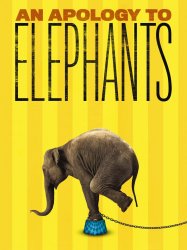
An Apology to Elephants (2013)
, 40minutesOrigin USA
Genres Documentary
Themes Films about animals, Environmental films, Documentary films about animal rights, Documentary films about law, Documentary films about environmental issues, Political films, Documentary films about nature
Actors Lily Tomlin
Rating79%





The documentary begins by showing the transfer of elephants from a train; the narrator states that "the elephants need our help". It proceeds with Joyce Poole, an elephant biologist, discussing some of the characteristics of an elephant, including mirror recognition capability. Cynthia Moss and Katy Payne explain some of the habits of elephants. While discussing anthropomorphism of elephants, Indian scientist Raman Sukumar states that elephants have a love–hate relationship with human society. The documentary then describes elephant capture for public display in circuses and zoos.
 Connection
Connection